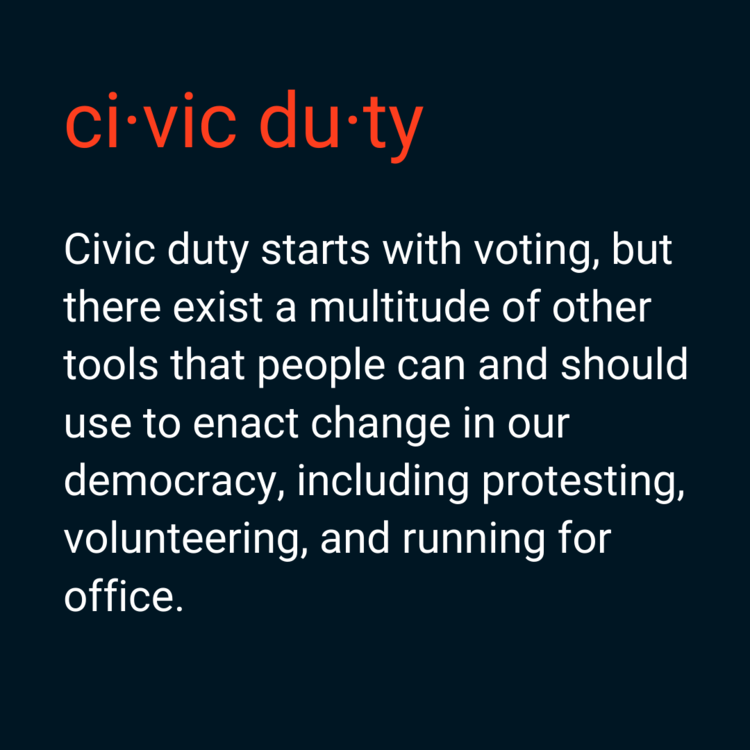When we step into a ballot booth, and step out to receive our “I voted” sticker, we’ve cast our choice for our representative. We’ve fulfilled our responsibility – or have we? Elections aren’t the only step – or even the final step – in building a democracy. In fact, elections are merely the first step, an entryway into a democracy based on the rule of law. The engine that powers democracy between elections is people doing their civic duty. We’re all consumers of democracy. You need to be a producer of democracy, too.
Our civic duty is that set of responsibilities (including protesting, volunteering, and running for office) that we hold as individuals who belong to a community. And we use that duty to address issues of public concern and promote the quality of our community that, in turn, improves our own well-being. This commitment of ours as citizens is complementary to the duties of our elected officials. Elected officials put into action what their voters demand of them. But, if you are part of a group too small to have an effect at the ballot box, or if your politics were defeated at the ballot box, or if your community has too many issues to be dealt with effectively by one elected official, then you need to take action – to perform your civic duty – to improve your community.
In a previous defining democracy narrative we discussed the importance of voting. But besides voting, there are many other ways that we can help strengthen our democracy. Each American has a toolbox that they can access to make their voices heard, exercise their agency, and enshrine their values in the world around them. It is both our privilege and duty to use these tools to effect change both at home and abroad.
When Americans protested for the expansion of women’s suffrage, the expansion of rights for African-Americans in the Civil Rights movement, the expansion of marriage to LBGTQ Americans, or the protection of religious freedom, citizens played a key role in advancing change. This was especially true when the government was at first apprehensive, or even forcefully opposed, to changing its stance. Because we have the privilege to peacefully protest in this country, we must exercise this right just like the brave leaders who came before us had done. Indeed, when you think of the events and policies in the country that make you angry or sad, how do you harness that emotion? Do you grumble at the dinner table or sigh with indignation? As an American, you have the privilege to protest, to hold up a picket sign, to take action and see change. You have a duty to, as well.
Along with protesting, we can also volunteer with the organizations that support our dreams for a better America. By providing both funds and action to organizations such as UNICEF, The Salvation Army, Heifer International, and local food pantries and soup kitchens, we help fill a void in the American fabric. By volunteering, we first and foremost help those in need while also showing the government where we need its help most.
Direct action like protesting and volunteering is a powerful tool, and one that is underutilized in our American democracy. It also helps us resolve a common critique of voting: that the effects are rarely seen. While this is a misconception, we can also supplement (as opposed to replace) voting by making real-world changes at the micro-level.
And if all else fails, run for office! If your representative disappoints you, then perhaps you can make an impact from within the government. Our politicians come from diverse backgrounds, ranging from farming, legal work, business, and the military. This diversity makes us stronger, for when we give a voice to the many groups in our society, we benefit from the discussion that arises from that confluence of ideas. Even if you don’t make it into office, your ideas may be adopted by others and even go so far as to spark a movement.
Finally, we must not forget those citizens who serve our country in the armed forces, and especially those who have made the ultimate sacrifice to preserve our democracy. Veterans and members of the armed forces shine as examples of civic duty who fight for our right to use the tools we’ve been given. If not for the many tangible benefits that civic engagement confers, participate in American democracy for those who risked and gave their lives to enable you to do so in the first place.
We have looked at four different ways to engage with our democracy, but there are many more ways to get involved. You can participate in political debates and town halls, interface with your school district’s PTA, and donate to politicians and campaigns you support. How you decide to participate (aside from your duty to vote) doesn’t matter as much as that you find a way that matters to you. The “fuel” of democracy is participation and to keep the American democracy running, we need to do more than just voting. We need deliberation and engagement. Find a way that speaks to you, and try to get others involved; our democracy depends on it.




